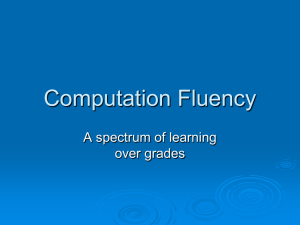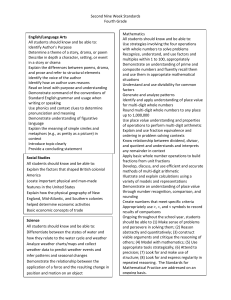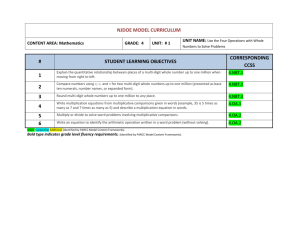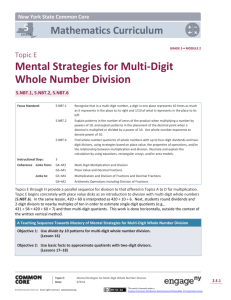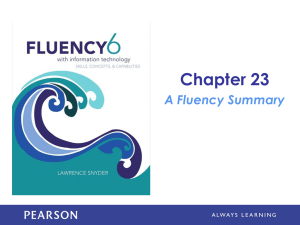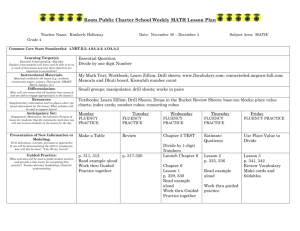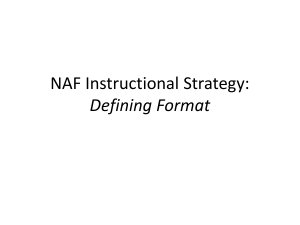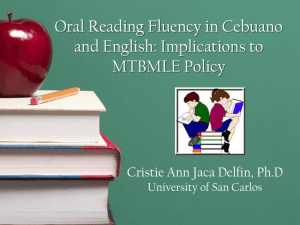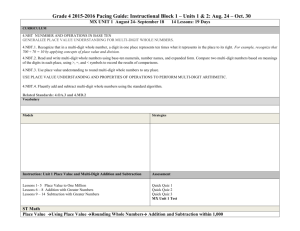Fourth grade math Module 1 Lessons 1
advertisement
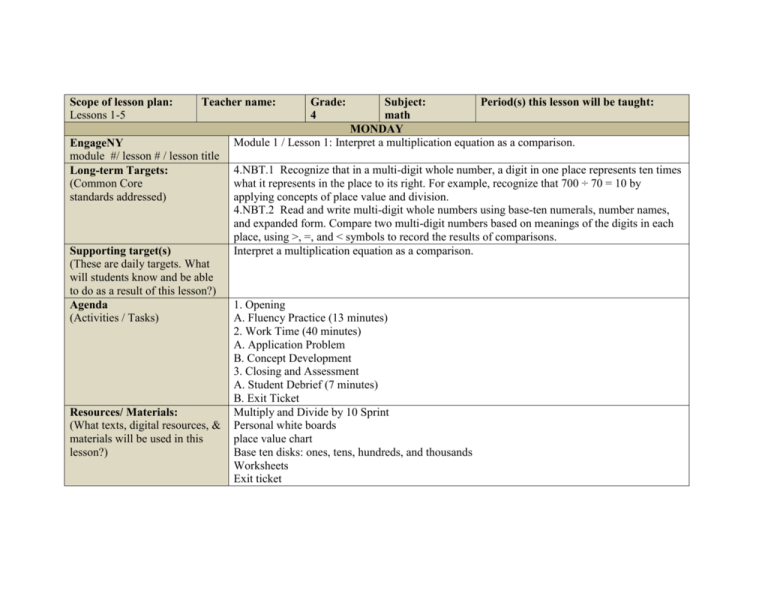
Scope of lesson plan: Lessons 1-5 Teacher name: EngageNY module #/ lesson # / lesson title Long-term Targets: (Common Core standards addressed) Supporting target(s) (These are daily targets. What will students know and be able to do as a result of this lesson?) Agenda (Activities / Tasks) Resources/ Materials: (What texts, digital resources, & materials will be used in this lesson?) Grade: 4 Subject: Period(s) this lesson will be taught: math MONDAY Module 1 / Lesson 1: Interpret a multiplication equation as a comparison. 4.NBT.1 Recognize that in a multi-digit whole number, a digit in one place represents ten times what it represents in the place to its right. For example, recognize that 700 ÷ 70 = 10 by applying concepts of place value and division. 4.NBT.2 Read and write multi-digit whole numbers using base-ten numerals, number names, and expanded form. Compare two multi-digit numbers based on meanings of the digits in each place, using >, =, and < symbols to record the results of comparisons. Interpret a multiplication equation as a comparison. 1. Opening A. Fluency Practice (13 minutes) 2. Work Time (40 minutes) A. Application Problem B. Concept Development 3. Closing and Assessment A. Student Debrief (7 minutes) B. Exit Ticket Multiply and Divide by 10 Sprint Personal white boards place value chart Base ten disks: ones, tens, hundreds, and thousands Worksheets Exit ticket Relevance/Rationale: (How do the strategies employed meet students’ needs?) EngageNY module #/ lesson # / lesson title Long-term Targets: (Common Core standards addressed) Supporting target(s) (These are daily targets. What will students know and be able to do as a result of this lesson?) Agenda (Activities / Tasks) Resources/ Materials: (What texts, digital resources, & Fluency 1: Reviewing this fluency will acclimate students to the Sprint routine, a vital component of the fluency program. Fluency 2: Reviewing and practicing place value skills in isolation will prepare students for success in multiplying different place value units during the lesson. Application Problem: As the first lesson of the year, this application problem reviews area and perimeter, multiplication, and addition—all important concepts from Grade 3. This problem can be extended after the Concept Development by asking students to find an area 10 times as much as the grass sod, or to find a perimeter 10 times as wide and 10 times as long. TUESDAY Module 1 / Lesson 2: Recognize a digit represents 10 times the value of what it represents in the place to its right. 4.NBT.1 Recognize that in a multi-digit whole number, a digit in one place represents ten times what it represents in the place to its right. For example, recognize that 700 ÷ 70 = 10 by applying concepts of place value and division. 4.NBT.2 Read and write multi-digit whole numbers using base-ten numerals, number names, and expanded form. Compare two multi-digit numbers based on meanings of the digits in each place, using >, =, and < symbols to record the results of comparisons. Recognize a digit represents 10 times the value of what it represents in the place to its right. 1. Opening A. Fluency Practice (12 minutes) 2. Work Time (39 minutes) A. Application Problem B. Concept Development C. Problems 1-4 D. Problem Set 3. Closing and Assessment (9 minutes) A. Student Debrief B. Exit ticket Personal white boards with a place value chart to thousands Worksheets materials will be used in this lesson?) Relevance/Rationale: (How do the strategies employed meet students’ needs?) EngageNY module #/ lesson # / lesson title Long-term Targets: (Common Core standards addressed) Supporting target(s) (These are daily targets. What will students know and be able to do as a result of this lesson?) Agenda (Activities / Tasks) Exit ticket Fluency 1: Practicing skip-counting on the number line builds a foundation for accessing higher order concepts throughout the year. Fluency 2: Reviewing and practicing place value skills in isolation will prepare students for success in multiplying different place value units during the lesson. Fluency 3: This fluency will review concepts learned in Lesson 1. Application Problem: This application problem builds on the concept from the previous lesson of 10 times as many. WEDNESDAY Module 1 / Lesson 3: Name numbers within 1 million by building understanding of the place value chart and placement of commas for naming base thousand units. 4.NBT.1 Recognize that in a multi-digit whole number, a digit in one place represents ten times what it represents in the place to its right. For example, recognize that 700 ÷ 70 = 10 by applying concepts of place value and division. 4.NBT.2 Read and write multi-digit whole numbers using base-ten numerals, number names, and expanded form. Compare two multi-digit numbers based on meanings of the digits in each place, using >, =, and < symbols to record the results of comparisons. Name numbers within 1 million by building understanding of the place value chart and placement of commas for naming base thousand units. Reviewing and practicing place value skills in isolation will prepare students for success in writing multi-digit numbers in expanded form This fluency will prepare students for success in writing multi-digit numbers in expanded form. 1. Opening A. Fluency Practice (15 minutes) 2. Work Time ( 38 minutes) A. Application Problem B. Concept Development C. Problems 1-3 D. Problem Set 3. Closing and Assessment (7 minutes) A. Student Debrief B. Exit ticket Resources/ Materials: (What texts, digital resources, & materials will be used in this lesson?) Relevance/Rationale: (How do the strategies employed meet students’ needs?) EngageNY module #/ lesson # / lesson title Long-term Targets: (Common Core standards addressed) Supporting target(s) (These are daily targets. What will students know and be able to do as a result of this lesson?) Agenda (Activities / Tasks) Multiply by 3 Sprint Personal white boards with million-place value chart outline template Worksheets Exit ticket Fluency 1: This fluency will review a foundational third grade standard that will help students learn standard 4.NBT.5. Fluency 2: Reviewing and practicing place value skills in isolation will prepare students for success in multiplying different place value units during the lesson. Fluency 3: This fluency will bolster students’ place value proficiency while reviewing multiplication concepts learned in Lessons 1 and 2. Application Problem: This application problem builds on the concept from the previous lesson of determining 10 times as much as a number. Concept Development: Students will go beyond the 4.NBT standard of using numbers less than or equal to 1 million to establish a pattern within the base ten units. THURSDAY Module 1 / Lesson 4: Read and write multi-digit numbers using base ten numerals, number names, and expanded form. 4.NBT.1 Recognize that in a multi-digit whole number, a digit in one place represents ten times what it represents in the place to its right. For example, recognize that 700 ÷ 70 = 10 by applying concepts of place value and division. 4.NBT.2 Read and write multi-digit whole numbers using base-ten numerals, number names, and expanded form. Compare two multi-digit numbers based on meanings of the digits in each place, using >, =, and < symbols to record the results of comparisons. Read and write multi-digit numbers using base ten numerals, number names, and expanded form. This fluency will prepare students for success in writing multi-digit numbers in expanded form. 1. Opening A. Fluency Practice (13 minutes) 2. Work Time (32 minutes) A. Application Problem B. Concept Development C. Problems 1-3 Resources/ Materials: (What texts, digital resources, & materials will be used in this lesson?) Relevance/Rationale: (How do the strategies employed meet students’ needs?) EngageNY module #/ lesson # / lesson title Long-term Targets: (Common Core standards addressed) Supporting target(s) (These are daily targets. What will students know and be able to do as a result of this lesson?) Agenda (Activities / Tasks) D. Problem Set 3. Closing and Assessment (15 minutes) A. Student Debrief B. Exit ticket Personal white boards place value chart to the hundred thousands place value chart to the millions Worksheets Exit ticket Fluency 1: Practicing skip-counting on the number line builds a foundation for accessing higher order concepts throughout the year. Fluency 2: Reviewing and practicing place value skills in isolation will prepare students for success in writing multi-digit numbers in expanded form Fluency 3: This fluency will prepare students for success in writing multi-digit numbers in expanded form Application Problem: This application problem builds on the content of the previous lesson, requiring students to name base thousand units. It also builds from 3.NBT.2 (fluently add and subtract within 1000). FRIDAY Module 1 / Lesson 5: Compare numbers based on meanings of the digits, using >,<, or = to record the comparison. 4.NBT.2 Read and write multi-digit whole numbers using base-ten numerals, number names, and expanded form. Compare two multi-digit numbers based on meanings of the digits in each place, using >, =, and < symbols to record the results of comparisons. Compare numbers based on meanings of the digits, using >, <, or = to record the comparison. 1. Opening A. Fluency Practice (14 minutes) 2. Work Time (36 minutes) A. Application Problem B. Concept Development Resources/ Materials: (What texts, digital resources, & materials will be used in this lesson?) Relevance/Rationale: (How do the strategies employed meet students’ needs?) C. Problems 1-4 D. Problem Set 3. Closing and Assessment (10 minutes) A. Student Debrief B. Exit ticket Multiply by 4 Sprint Place value boards and markers (or place value disks) Worksheets Exit ticket Fluency 1: This fluency will review a foundational third grade standard that will help students learn standard 4.NBT.5. Fluency 2: This fluency will apply skip-counting fluency that was built during the first four lessons and apply it to the multiplying by ten lessons. Fluency 3: Reviewing and practicing place value skills in isolation will prepare students for success in comparing numbers during the lesson. Application Problem: This application problem builds on the content of the previous lesson, requiring students to read and write multi-digit numbers in expanded, word, and unit forms.
